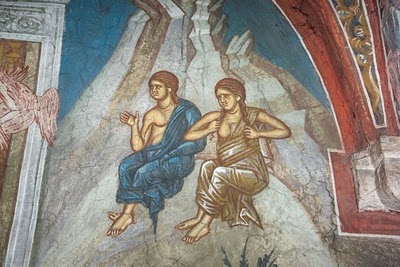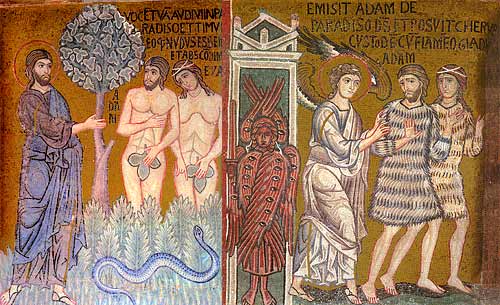The Liturgical Theme of the Sunday of Forgiveness, The Casting out of Adam from Paradise
The prerequisite for true forgiveness.

(http://www.srpskoblago.org/Archives/Decani/exhibits/Collections/Genesis/CX4K2306_l.html)
Adam and Eve Lamenting
What is the dominant liturgical theme of Forgiveness Sunday? This is not a trick question. It is NOT that we would forgive our brethren. The theme is concerning the absolute prerequisite for us to be able to forgive others. Without this virtue, we are lost, having darkened understanding, and blindly stumbling through life.
The services for Forgiveness Sunday, also known as the “Casting out of Adam from
Here are some examples, truly few among many from Vespers and Matins:
Come, my wretched soul, and weep today over thine acts, remembering how once thou wast stripped naked in Eden, and cast out from delight and unending joy. (Matins Canon, Ode I)
In my wretchedness, O Lord, I have disobeyed Thy commandment. / Woe is me! I have been stripped of glory, / filled with shame, and cast out from the joy of

The casting out of Adam and Eve from
We will not forgive others; neither will we be able to forgive others unless we have a realistic view of ourselves. If we know ourselves, we will be softened with humility, and will not judge others. If we are lightened of the burden of judging others, we will freely forgive them, and according to the Gospel dogma, we will be forgiven of all of our sins.
This is why, on the day in which we ask forgiveness of all our brethren, we prepare ourselves by contemplating our sinfulness and the great tragedy of The Fall – Our fall.
The world and worldly Christianity (to make an oxymoronic association) does not spend much (or any!) time with personal introspection and admission of faults. The church is not worldly, and is brutally honest regarding human nature. We should listen carefully to the services because we need to find a cure for our spiritual blindness. The best time to apply a healing plaster to our pride, vainglory and blindness to self is when we stand and pray the whole of Matins and especially the Matins canon. Any pastor who serves the vigil knows this and has the fervent hope that his flock will attend the vigil with expectation and zeal.
From recent reading:
44. He who is afraid of being cast out of the bridal chamber as an interloper[1] should either carry out all of God’s commandments, or else he should strive to fulfill just one of them – humility (Ilias the presbyter, Gnomic Anthology I, from the Philolakia, The complete text, Volume 3, pg39.)
Careful prayer in the services and in our daily prayers will help produce the humility that St Ilias is speaking of. Of course, he is not advocating that we “only” be humble – as such a feat is IMPOSSIBLE. The truly humble man will forgive all, and fulfill the two great commandments[2] with exactitude. Without humility, we have no chance to recognize our own sins, and with a darkened mind, will judge our brother, and condemn ourselves. It is important that we meditate upon our human condition.
The church gives the perfect example of how to do this – a balance of lamentation and hope in God’s mercy. Without both these actions, we will never fully forgive our brother.
I beg all my flock to change their usual patterns and attend the entire Saturday vigil with expectation. The themes of repentance and hope in God will be particularly rich this season. “Come and see” whether there are changes that occur in your soul because of your increased attention to prayer.
Priest Seraphim Holland 2011. St Nicholas Russian Orthodox Church, McKinney, Texas
This article is at:
New Journal entries, homilies, etc. are on our BLOG: http://www.orthodox.net/redeemingthetime
Journal Archive: http://www.orthodox.net/journal
Blog posts & local parish news are posted to our email list. Go to here: http://groups.google.com/group/saint-nicholas-orthodox-church to join.
Redeeming the Time BLOG: http://www.orthodox.net/redeemingthetime
Use this for any edifying reason, but please give credit, and include the URL of the article. This content belongs to the author. We would love to hear from you with comments! (seraphim@orthodox.net)
[1] Cf Matthew 22:1-13 and especially: “Mat 22:11: And when the king came in to see the guests, he saw there a man which had not on a wedding garment: (12) And he saith unto him, Friend, how camest thou in hither not having a wedding garment? And he was speechless. (13) Then said the king to the servants, Bind him hand and foot, and take him away, and cast him into outer darkness; there shall be weeping and gnashing of teeth.”
[2] Mat 22:36-40 KJV “Master, which is the great commandment in the law? (37) Jesus said unto him, Thou shalt love the Lord thy God with all thy heart, and with all thy soul, and with all thy mind. (38) This is the first and great commandment. (39) And the second is like unto it, Thou shalt love thy neighbor as thyself. (40) On these two commandments hang all the law and the prophets.”